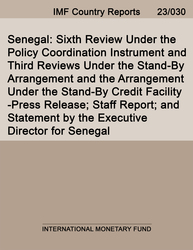
Senegal: Sixth Review Under the Policy Coordination Instrument and Third Reviews Under the Stand-By Arrangement and the Arrangement Under the Stand-By Credit Facility-Press Release; Staff Report; and Statement by the Executive Director for Senegal
Senegal: Sixth Review Under the Policy Coordination Instrument and Third Reviews Under the Stand-By Arrangement and the Arrangement Under the Stand-By Credit Facility-Press Release; Staff Report; and Statement by the Executive Director for Senegal
READ MORE...
Volume/Issue:
Volume 2023
Issue 030
Publication date: January 2023
ISBN: 9798400230882
$20.00
Add to Cart by clicking price of the language and format you'd like to purchase
Available Languages and Formats
| English | |||
| French |
Prices in red indicate formats that are not yet available but are forthcoming.
Topics covered in this book
This title contains information about the following subjects.
Click on a subject if you would like to see other titles with the same subjects.
Economics- Macroeconomics , Money and Monetary Policy , Public Finance , International - Economics , Senegalese authorities , debt policy , deficit target , IMF staff calculation , transparency policy , Energy subsidies , Government debt management , Budget planning and preparation , Global
Also of interest
Summary
This paper focuses on Senegal’s Sixth Review under the Policy Coordination Instrument and Third Reviews under the Stand-By Arrangement and the Arrangement under the Standby Credit Facility. Weaker external demand, rising food and energy prices, tightening financial conditions, and the US dollar appreciation have negatively impacted the Senegalese economy. Moreover, multiple challenges are facing the country, including heightened regional insecurity and growing social demands amid soaring cost of living. Program performance was broadly satisfactory. All end-June 2022 performance criteria and two out of three indicative targets were met. Three out of nine structural benchmarks were implemented on time. Revenue collection through end- September was stronger than expected but soaring energy subsidies led the government to delay some investment projects. Spending pressures are mounting in 2023, making the much-needed fiscal consolidation more difficult. The authorities and staff agreed on a revised 2022 budget that maintains the fiscal deficit at 6.2 percent of gross domestic product, in line with the previous program review, through additional revenue measures and savings to offset larger energy subsidies.
Copyright © 2010 - 2026
Powered by:
AIDC



